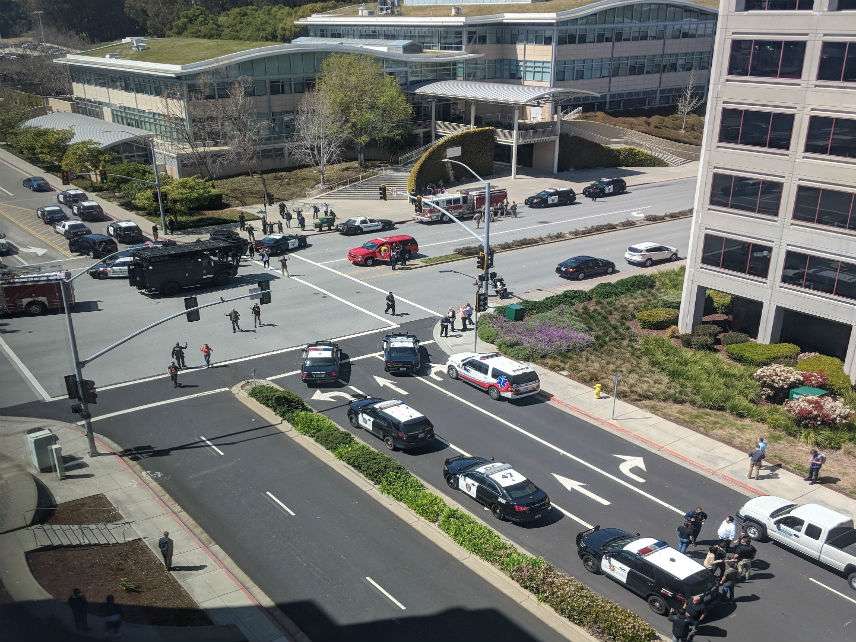There's Almost Certainly Nothing Congress Could Have Done to Stop the YouTube Shooting
Looking for political or cultural calls to action in this act of violence is a fool's errand.
As I write this, almost nothing is known about the identity, motive, or even weapon used by the woman who shot four three people at YouTube's office in San Bruno, California, today.

CNN is reporting that the shooter, dead at her own hand, knew at least one of her victims, according to police sources. MSNBC tweets also indicate she had a specific grievance against at least one of her victims. [UPDATE: Later reporting backtracks on all that, claiming there is no reason to believe she knew any of her victims.] This indicates, in all likelihood, what one would normally consider a standard crime of violence: someone with a grievance against someone else she thought justified attempted murder. This is tragic, and a near-constant part of human social life since the beginning of recorded history. We have not yet found a way to craft a world in which no one has so much grief, or evil, or anger, that she might see such a crime as justified. [UPDATE: The shooter has been identified as Nasim Aghdam, born in Iran and a radical vegan with an animus against YouTube over how it treated her channel.]
Gabrielle Giffords, the former congresswoman and herself a victim of a would-be killer using a gun, has already sent out an emailed press release (online here) connecting this woman's crime with congressional inaction: "How much longer do we have to wait before Congress takes action to make our communities safer from gun violence? How many more breaking news updates about active shooters do we have to live through? How many more lives will be lost?"
While as I type I do not know what sort of weapon the killer used [UPDATE: likely a handgun from eyewitness reports], there is no imaginable world in which anything Congress could have done, either in the past weeks or past years, would have prevented her from potential access to a weapon to facilitate her wish to commit this crime. Giffords, perhaps unaware she is doing this, is positing the political power to make hundreds of millions of existing weapons in circulation just plain disappear from the face of the Earth, imagining laws that do something far beyond any of the specific laws (regarding things such widening the types of people prohibited from owning guns moving forward, widening the types of gun sales requiring background checks, banning certain specific types of weapons or magazines) usually advocated in the wake of public shootings (most of which, even had they been in existence and enforced with universal success, would not or would not necessarily have stopped such crimes).
The shooter being a woman already seems of interest to many, seen as putting the lie to the notion that these sort of public crimes are uniquely a product of something toxic in American masculinity. She may turn out to fall into some category that some substantial percentage of Americans mistrust for some reason, whether because of her religion, her citizenship status, her politics, her mental health, her attitudes toward guns, or toward YouTube, or toward men. Yet it would be unreasonable in the extreme to take the action of this one member of whatever group you could pigeonhole her in as saying anything worth knowing about how such people should be regarded or treated.
Like everything being said or thought about today's events, this is being written in vast ignorance of many specifics. Yet it is hard to imagine what we could learn that would reasonably mean her crime tells us anything of politico-cultural significance that requires changing the way we as a people think about any given issue, or certainly how our lawmakers make laws.
Guns exist, and cannot be eliminated. People with streaks of evil, madness, or grievance of any sort exist, and cannot be legislated away. California already has a set of gun control laws that are seen by most pro-gun control types as something the nation should aspire to. YouTube's offices had armed security.
That too many of us allow our minds to be whipsawed by our instant access to details about every random or rare horror life is rife with, that too many of us feel some obligation to come to some opinion about how such events mean the world must change in some way that satisfies our priors, does our politics and culture no good.
Nor is there any political or cultural solution to that problem, except to remind people (and ourselves) to be reasonable about the conclusions jumped to about every hideous public crime, and to be balanced and intelligent in understanding how law or politics could conceivably improve the situation.


Show Comments (203)